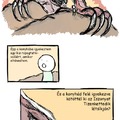Hellovörld speciál
2009.09.25. 14:40

Könnyedén nyomon követhetjük a programozók törzsfejlődését az általuk írt "Hello World!" szerzeményeik segítségével. Lássuk:
Általános iskola:
10 PRINT "HELLO WORLD" 20 END
Középiskola:
program Hello(input, output)
begin
writeln('Hello World')
end.
Egyetemista:
(defun hello
(print
(cons 'Hello (list 'World))))
Junior programozó:
#include <stdio.h>
void main(void)
{
char *message[] = {"Hello ", "World"};
int i;
for(i = 0; i < 2; ++i)
printf("%s", message[i]);
printf("\n");
}
Senior programozó:
#include <iostream.h>
#include <string.h>
class string
{
private:
int size;
char *ptr;
string() : size(0), ptr(new char[1]) { ptr[0] = 0; }
string(const string &s) : size(s.size)
{
ptr = new char[size + 1];
strcpy(ptr, s.ptr);
}
~string()
{
delete [] ptr;
}
friend ostream &operator <<(ostream &, const string &);
string &operator=(const char *);
};
ostream &operator<<(ostream &stream, const string &s)
{
return(stream << s.ptr);
}
string &string::operator=(const char *chrs)
{
if (this != &chrs)
{
delete [] ptr;
size = strlen(chrs);
ptr = new char[size + 1];
strcpy(ptr, chrs);
}
return(*this);
}
int main()
{
string str;
str = "Hello World";
cout << str << endl;
return(0);
}
Veterán programozó:
[
uuid(2573F8F4-CFEE-101A-9A9F-00AA00342820)
]
library LHello
{
// bring in the master library
importlib("actimp.tlb");
importlib("actexp.tlb");
// bring in my interfaces
#include "pshlo.idl"
[
uuid(2573F8F5-CFEE-101A-9A9F-00AA00342820)
]
cotype THello
{
interface IHello;
interface IPersistFile;
};
};
[
exe,
uuid(2573F890-CFEE-101A-9A9F-00AA00342820)
]
module CHelloLib
{
// some code related header files
importheader(<windows.h>);
importheader(<ole2.h>);
importheader(<except.hxx>);
importheader("pshlo.h");
importheader("shlo.hxx");
importheader("mycls.hxx");
// needed typelibs
importlib("actimp.tlb");
importlib("actexp.tlb");
importlib("thlo.tlb");
[
uuid(2573F891-CFEE-101A-9A9F-00AA00342820),
aggregatable
]
coclass CHello
{
cotype THello;
};
};
#include "ipfix.hxx"
extern HANDLE hEvent;
class CHello : public CHelloBase
{
public:
IPFIX(CLSID_CHello);
CHello(IUnknown *pUnk);
~CHello();
HRESULT __stdcall PrintSz(LPWSTR pwszString);
private:
static int cObjRef;
};
#include <windows.h>
#include <ole2.h>
#include <stdio.h>
#include <stdlib.h>
#include "thlo.h"
#include "pshlo.h"
#include "shlo.hxx"
#include "mycls.hxx"
int CHello::cObjRef = 0;
CHello::CHello(IUnknown *pUnk) : CHelloBase(pUnk)
{
cObjRef++;
return;
}
HRESULT __stdcall CHello::PrintSz(LPWSTR pwszString)
{
printf("%ws
", pwszString);
return(ResultFromScode(S_OK));
}
CHello::~CHello(void)
{
// when the object count goes to zero, stop the server
cObjRef--;
if( cObjRef == 0 )
PulseEvent(hEvent);
return;
}
#include <windows.h>
#include <ole2.h>
#include "pshlo.h"
#include "shlo.hxx"
#include "mycls.hxx"
HANDLE hEvent;
int _cdecl main(
int argc,
char * argv[]
) {
ULONG ulRef;
DWORD dwRegistration;
CHelloCF *pCF = new CHelloCF();
hEvent = CreateEvent(NULL, FALSE, FALSE, NULL);
// Initialize the OLE libraries
CoInitializeEx(NULL, COINIT_MULTITHREADED);
CoRegisterClassObject(CLSID_CHello, pCF, CLSCTX_LOCAL_SERVER,
REGCLS_MULTIPLEUSE, &dwRegistration);
// wait on an event to stop
WaitForSingleObject(hEvent, INFINITE);
// revoke and release the class object
CoRevokeClassObject(dwRegistration);
ulRef = pCF->Release();
// Tell OLE we are going away.
CoUninitialize();
return(0); }
extern CLSID CLSID_CHello;
extern UUID LIBID_CHelloLib;
CLSID CLSID_CHello={/*2573F891-CFEE-101A-9A9F-00AA00342820*/
0x2573F891,
0xCFEE,
0x101A,
{ 0x9A, 0x9F, 0x00, 0xAA, 0x00, 0x34, 0x28, 0x20 }
};
UUID LIBID_CHelloLib={/*2573F890-CFEE-101A-9A9F-00AA00342820*/
0x2573F890,
0xCFEE,
0x101A,
{ 0x9A, 0x9F, 0x00, 0xAA, 0x00, 0x34, 0x28, 0x20 }
};
#include <windows.h>
#include <ole2.h>
#include <stdlib.h>
#include <string.h>
#include <stdio.h>
#include "pshlo.h"
#include "shlo.hxx"
#include "clsid.h"
int _cdecl main(
int argc,
char * argv[]
) {
HRESULT hRslt;
IHello *pHello;
ULONG ulCnt;
IMoniker * pmk;
WCHAR wcsT[_MAX_PATH];
WCHAR wcsPath[2 * _MAX_PATH];
// get object path
wcsPath[0] = '\0';
wcsT[0] = '\0';
if( argc > 1) {
mbstowcs(wcsPath, argv[1], strlen(argv[1]) + 1);
wcsupr(wcsPath);
}
else {
fprintf(stderr, "Object path must be specified\n");
return(1);
}
// get print string
if(argc > 2)
mbstowcs(wcsT, argv[2], strlen(argv[2]) + 1);
else
wcscpy(wcsT, L"Hello World");
printf("Linking to object %ws\n", wcsPath);
printf("Text String %ws\n", wcsT);
// Initialize the OLE libraries
hRslt = CoInitializeEx(NULL, COINIT_MULTITHREADED);
if(SUCCEEDED(hRslt)) {
hRslt = CreateFileMoniker(wcsPath, &pmk);
if(SUCCEEDED(hRslt))
hRslt = BindMoniker(pmk, 0, IID_IHello, (void **)&pHello);
if(SUCCEEDED(hRslt)) {
// print a string out
pHello->PrintSz(wcsT);
Sleep(2000);
ulCnt = pHello->Release();
}
else
printf("Failure to connect, status: %lx", hRslt);
// Tell OLE we are going away.
CoUninitialize();
}
return(0);
}
Képzelem, akkor mit csinál egy nyugdíjas programozó, hogy valahogy elüsse az idejét, mielőtt elássák. Persze hasonlót a hackereknél is láthatunk:
Kezdő hacker:
#!/usr/local/bin/perl
$msg="Hello, world.\n";
if ($#ARGV >= 0) {
while(defined($arg=shift(@ARGV))) {
$outfilename = $arg;
open(FILE, ">" . $outfilename)
|| die "Can't write $arg: $!\n";
print (FILE $msg);
close(FILE) || die "Can't close $arg: $!\n";
}
} else {
print ($msg);
}
1;
Haladó hacker:
#include <stdio.h>
#define S "Hello, World\n"
main(){exit(printf(S) == strlen(S) ? 0 : 1);}
Tapasztalt hacker:
% cc -o a.out ~/src/misc/hw/hw.c % a.out
Hacker guru:
% echo "Hello, world."
Az is megtörténhet, hogy az ifjú és tehetséges programozó első munkahelyén ráeszmél, hogy menedzsment oltárán szeretné kiteljesíteni tehetségét. Lássuk, ő hogyan fejlődik.
Junior vezető:
10 PRINT "HELLO WORLD" 20 END
Középvezető:
mail -s "Hello, world." bob@b12 Bob, tudnál írni egy programot, ami kiírja: "Hello, world."? Holnapra kell! ^D
Felsővezető:
% zmail jim Kell egy "Hello World!" program. Tegnapra.
Vezérigazgató:
% letter letter: Command not found. % mail To: ^X ^F ^C % help mail help: Command not found. % picsaba! !: Event unrecognized % logout
A bejegyzés trackback címe:
Kommentek:
A hozzászólások a vonatkozó jogszabályok értelmében felhasználói tartalomnak minősülnek, értük a szolgáltatás technikai üzemeltetője semmilyen felelősséget nem vállal, azokat nem ellenőrzi. Kifogás esetén forduljon a blog szerkesztőjéhez. Részletek a Felhasználási feltételekben és az adatvédelmi tájékoztatóban.
-Szűcs Gyula- · http://nerdblog.blog.hu/ 2009.09.26. 21:47:44
20 END-et értem. Csak mi így nyomtuk általánosban:
10 PRINT "HÜLYE VAGY"
20 GOTO 10
:)
nik. 2009.10.16. 11:40:58
grizzancs 2010.02.28. 19:56:53
string &string::operator=(const char *chrs)
{
if (this != &chrs)











